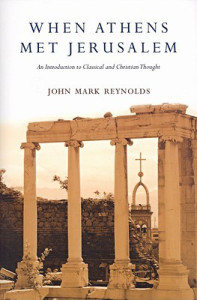
When Athens Met Jerusalem: An Introduction to Classical and Christian Thought. John Mark Reynolds. Downers Grove, IL: InterVarsity Press, 2009.
Summary: The Christian message advanced in a Greco-Roman World prepared in many ways by both the failure of the Homeric gods and the classic philosophers. This book explores the intellectual antecedents to the gospel in pre-Socratic, Socratic, Platonic and Aristotelian thought, culminating when Jerusalem meets Athens when Paul preaches on Mars Hill.
In the third century, the Christian Tertullian asked the questions, “What indeed has Athens to do with Jerusalem? What concord is there between the Academy and the Church? what between heretics and Christians?” For many Christians, this has been the last word on the matter and they have decided there is little or nothing of value in studying the Greek philosophers of the Classical tradition preceding the advent of Christianity.
John Mark Reynolds would argue to the contrary pointing out both how Greek philosophy prepared the way for the gospel as it groped for something beyond the gods of Homer and tried to explain why there is cosmos rather than chaos. It gave us the humility of wisdom in Socrates who knew that he didn’t know. It gave us the dilemma of the cave and the question of what is the really real. It gave us the Aristotelian mean in ethics and the cultivation of virtue. And yet it failed to deliver Greece from the power hungry Alexander, the decay of its civilization, its lapse back into pagan deities and gnostic mysteries that failed to illumine and give hope. It prepared the way for the Apostle Paul to appear on Mars Hill to speak of the “unknown God” who has revealed himself scandalously in the resurrection of his son.
The book is a useful and sympathetic survey of classical thought. Reynolds begins with the pre-Socratic philosophers in chapter 1, Socrates in chapter 2, Plato in chapters 3-7, Aristotle, the pupil of Plato in chapters 8 and 9, and finishes with the neo-Platonists, Epicureans, and Stoics in chapter 10. The end of chapter ten concludes with the preaching of Paul addressing a culture, prepared by this lineage.
If I had any criticism, it would be that this book is long on Athens and short on Jerusalem. Perhaps Reynolds felt that this is all he could do in a book of this length. Yet it seems that the whole book intentionally builds toward the intersection of Athens and Jerusalem. Reynolds spoke of giving us a whirlwind tour through the classical Greeks. I think he could possibly have given us a tighter summary and explored more of the engagement between Greek philosophy and Christian theology. Clearly this has shaped Western Christianity to the present, but the shape and critique of that engagement is sparse in this book. It is clear that Reynolds is more favorable to the Greek philosophers than either Tertullian or many moderns. Perhaps it is because he so loves his subject matter of the Greek philosophers. A more in depth discussion of that engagement could have been a valuable contribution.
This is a useful secondary text for students, particularly Christian students, reading the classics. Reynolds provides helpful context and commentary and helps show the relevance of the questions these philosophers were asking as well as the thought world Christians encountered as the gospel established a beachhead in Europe during the missionary journeys of Paul. It also serves as a helpful review for some of us who read these classics many years ago and need a “brush up.”
Editor’s Note: Thank-you to Bob Trube for sharing his reviews with Emerging Scholars! Bob first posted the above review on Bob on Books. A related piece (also reviewed by Bob and which I recently drew from in a campus visit) is The Gospel in the Marketplace of Ideas: Paul’s Mars Hill Experience for Our Pluralistic World by Paul Copan and Kenneth D. Litwak (Downers Grove, IL: InterVarsity Press, 2014). ~ Thomas B. Grosh IV, Associate Director, Emerging Scholars Network
Bob Trube is a former Associate Director of Faculty Ministry and Director of the Emerging Scholars Network. He blogs on books regularly at bobonbooks.com. He resides in Columbus, Ohio, with Marilyn and enjoys reading, gardening, choral singing, and plein air painting.

Leave a Reply